#ulster scots
Text
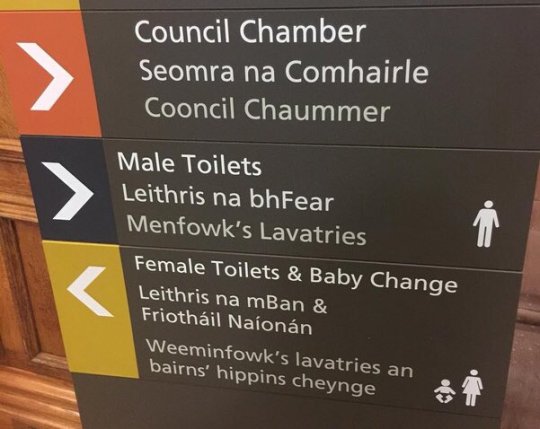
8 notes
·
View notes
Text
At least the Irish language is a real language.
Ulster Scots is just an accent at worst and slang at best.
It barely qualifies as a dialect.
So no.
It is NOT the same as the Irish language.
To suggest otherwise is insulting to threatened and endangered languages!
I’ll admit idk much about Scots as a language.
But Ulster Scots isn’t remotely comparable.
#personal stuff#dougie rambles#vent post#political crap#ireland#indigenous languages#threatened languages#languages#irish language#fuck’s sake#gaelige#Ulster Scots
21 notes
·
View notes
Text
Deil? Aboot? Frae?
Did Bram Stoker just accurately portray a regional accent? And that regional accent is Ulster Scots?
#dracula daily#bram stoker's dracula#bram stoker’s accents#i didn’t know he could do that#ulster scots#nicegirlposts
15 notes
·
View notes
Text

Reference, info, etc.
Acc. to Grant, between 1713 and 1775 more than a quarter of a million Ulster Scots and their kinfolk from the Scottish Lowlands migrated to America and became known as the Scotch-Irish. (p. 121).
2 notes
·
View notes
Note
And another question re: Gaelic post…can you talk more about Scots, and how it came to be seen as the more “educated” language compared to Gaelic, as well as how the language is viewed now?
Barrie quaisten!
SCOTS
Scots is another Anglic language closely related to English. There is heated debate (often, unfortunately, along political party lines) over whether it should be considered a language or a dialect. However, the linguistic consensus is that Scots is indeed its own distinct language, complete with its own vocabulary, grammar rules, and historical character. It's akin to the relationship between Danish and Norwegian - while they share a relatively recent common ancestor and have influenced each other over the course of history (however lop-sided that influence may be), they are indeed separate languages.
Around the 600s CE, a new language appeared in the southeast corner of Scotland, back when this area was under the control of certain new-ish arrivals to the island who spoke a Germanic tongue. At this point, Middle Irish (modern Gaelic's immediate ancestor) was the court language of Scotland, and would remain so until the reign of David I, crowned in 1124. Scots is said to have begun diverging from the Northumbrian Old English dialect in earnest by the 1100s, although records of the language are sparse before about 1375 (the beginning of the Early Scots literary period) owing to Viking and English "meddling" (some light raiding here, some plundering there, general theft, and so on). Owing to its Northumbrian origin and heavier Scandinavian influence (stemming from close ties with the Danelaw), Scots has more of an Anglian and Norse character to it as opposed to its relatively more Saxon-y, Norman-y cousin to the south (i.e., English). Scots has also had much closer contact with languages like Scottish Gaelic and even Pictish and Cumbric (which I'll be sure to cover in a future post), and as a result has been influenced in its vocabulary and phonology.
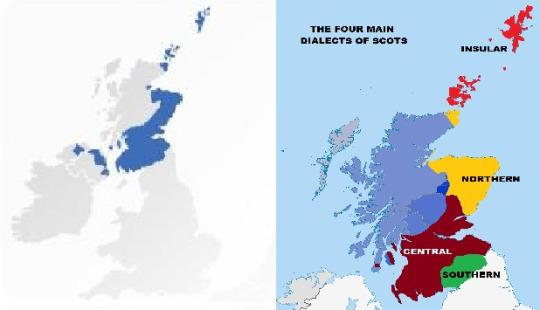
It has several dialects of its own, broadly categorized by location, ranging from Borders Scots to Orcadian Scots and everything in between. (And we can't forget Ulster Scots, a dialect brought to Ulster during the 1600s by Lowlander planters.) Due to this variation, modern Scots has no clear standardized form, though linguists have made several halfway-serious attempts over the past century or so to standardize orthography.
But what's been going on with Scots between David I and the present day? Let's dig in.
David I (in Gaelic, Daibhidh I mac Mhaoil Chaluim), who reigned from 1124 to 1153, initiated the proliferation of proto-urban societies across his kingdom. These societies were called "burghs", or "touns" in Scots, and they'll come in handy later. At about this same time, Norman French began to infiltrate the Scottish nobility, and Gaelic began to decline as a language of prestige among higher levels of society.
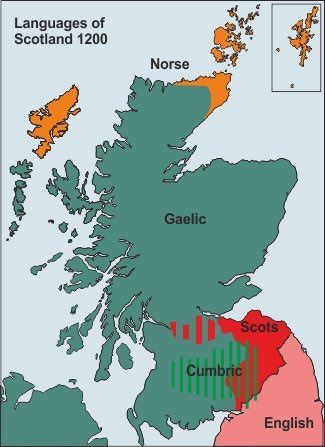
Once the 1200s started to creep around, the northern dialect of Early Middle English that would become Scots began expanding ever northward towards the Forth-Clyde line. This dialect was called "Inglis" by its speakers, and over the next century, it began to supplant Norman French and Gaelic as a common language within the burghs. The 1300s saw this "Inglis" tongue grow in prestige and it began to eclipse Norman French at even the higher levels of society, particularly within the courts. As the 1400s approached, it even began to replace Latin as the language of ecclesiastical and royal court proceedings.
The 1400s saw a relatively rapid geographic spread of Scots at the expense of Gaelic, which was cornered into the Highlands, Western Isles, and small pockets in the Lowlands (viz. Galloway, where Gaelic survived at least up to 1760). By the early 1500s, Scots began to be known as "Scottis", and Gaelic, which had previously been referred to thus, was now being dubbed "Erse" ("Irish") in attempts to otherize Gaelic. The 1500s saw the advent of Middle Scots, which was, in my amateur opinion, the golden era of the language, owing to its undisputed support at all levels of society across most of the kingdom. Around this time, a loose written standard did exist, but the language was still written how it sounded and regional variation was commonplace.

1567, however, saw the coronation of James VI of Scotland (note: James I of England and Ireland as well from 1603 on). His famous Bible translation (KJV) helped to set in motion the gradual Anglicization of Scottish society as it was dispersed among the population. In 1603, the Union of the Crowns brought Scots-speaking and English-speaking nobles into closer contact, and English gradually began to dominate the speech of the Scottish nobility (this exchange would produce what is now Scottish English, a distinct standardized dialect of English that some argue is one end of a linguistic spectrum, at the other end being "braid Scots").
Beginning in 1610 and continuing through to the 1690s, Scottish planters from across the western Lowlands and the Borders began to settle in Ulster, the northeastern region of Ireland. Over time, this group of people would come to develop their own regional identity, the Ulster Scots (or, often in a New World context, Scots-Irish). Their local dialect of Scots, while maintaining a Lowland character, picked up various influences from Hiberno-English (particularly in phonology) and from the Irish language (various contributions of vocabulary).

By about 1700, written Scots, at least in an official capacity, had become almost completely Anglicized. An example of an Anglicized convention introduced to Scots writing is the "apologetic apostrophe", an apostrophe that was inserted into a Scots word where an English-speaking person might expect a letter to be (for example, the Scots word "wi" (in English, "with") would have been written wi'). In 1707, the Acts of Union (Note: Panama played a role) seemed to solidify a shift in the upper-class opinion of the Scots language - what scarcely 150 years before was seen as the national language was now looked down upon by the nobility as "uneducated speech" or "bad English".
However, things looked different from a lower- and middle-class perspective. Contrary to high society, the common people began to take a renewed interest in the Scots language, and a literary revival began. This mid-1700s revival gave us such world-famous names as Robert Burns, Walter Scott, and Thomas Campbell. It was at this time that Scots transitioned from Middle to Modern Scots. However, features such as the apologetic apostrophe were retained during this period to gain wider readership among an English-speaking audience, a market that now effectively spanned the globe. (Meanwhile, the Highlands and Lowlands each experienced their own set of Clearances, and Scotland's diaspora began their journey to the edges of the empire.)
By the early 1800s, this "Scots fever" (NOTE: not a technical term) had reached the upper classes of society as they increasingly turned a Romanticist eye to the literature of their homeland, while simultaneously keeping Gaelic at arm's length. Since this point, there hasn't been any sort of top-level, government-sanctioned, institutional spelling reform or rulebook published on Scots orthography, although this hasn't stopped a wealth of Scots poetry and prose from being published through the years.
Since this era, there has been a relatively steady stream of interest in the language, though recent government initiatives have been taken to attempt to ensure the survival of, and increase interest in, Scots. This 2010 study by the Scottish Government sheds some light on modern public perception of the language within Scotland itself.
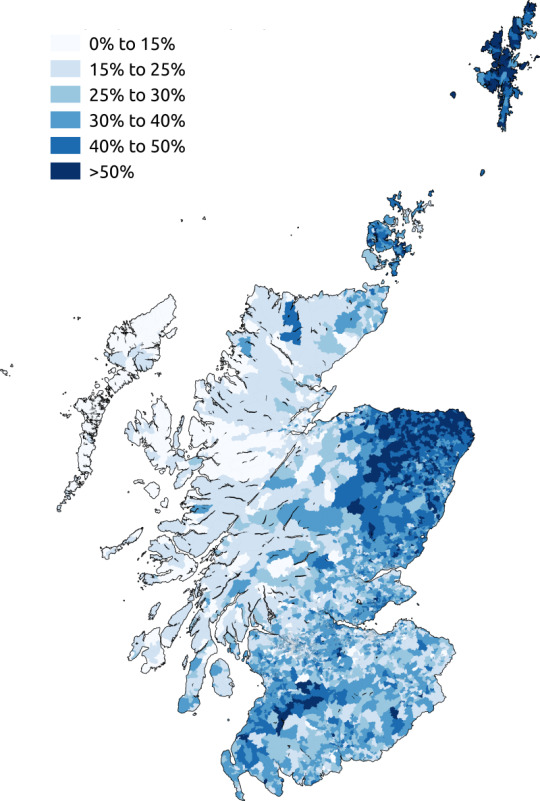
Over in Northern Ireland, the Ulster-Scots Agency was established as part of the wider Belfast Agreement of 1998 in efforts to promote the language and wider culture.
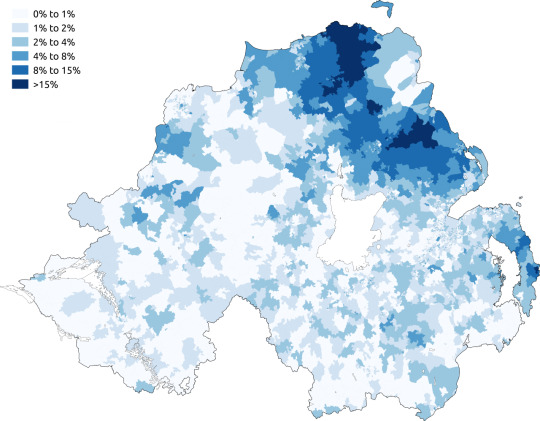
It's not all roses these days, however. A couple of years ago, it came to light that a North Carolina teenager had been, for over seven years, writing entries on the Scots Wikipedia, without any knowledge of the language. One Reddit user remarked that this teenager had caused "more damage to the Scots language than anyone else in history." (Perhaps take this with a grain of salt.)
Would you like to help protect the language?
The best way to protect a language is to learn it! If you click that link, there are several resources for adult learners of Scots to start their journey. My perennial advice, though: once you've got the basics down, use it! Find a Scots speaker and stumble your way through a conversation. Don't be afraid of making mistakes! (Note: everyone makes them.) One resource I've used in the past to learn some basics is the Open University's (entirely free!) Scots language and culture online course. All you need to do is sign up and work through the modules!
Follow for more linguistics and share this post! If you have any questions, feel free to ask!
#scots#scotland#germanic#language#languages#learning languages#langblog#langblr#indo european#united kingdom#ireland#northern ireland#ulster
215 notes
·
View notes
Note
So who used to live in Ireland until Irish people invaded the country and ethnically-cleansed the non-Irish people so that they can now be the new majority in their ethno-state?
The Fir Bolg and the Tuatha Dé Danann, obviously
#this is a joke but uh. first of all i never claimed the ireland analogy was completely and perfectly translatable to israel and palestine#but even still there's something to be said about the Ulster Scots. people who share extremely close genetic ties to the Irish#who likely originally came from ireland. and yet. are now a distinct cultural/ethnic group with a distinct religion.#and as such no longer carry irish ancestral birthrights like emigration and voting status
8 notes
·
View notes
Text
i can never tell if all the other dialects hate ulster irish or if ulster irish hates itself tbh
#like girlie#why r u making things harder for urself#and by extension; me#its probs something to do with the ulster plantations and the exposure to scots and english but lets ignore that bc it happening out of#nowhere and ulster irish just deciding to be strange with no explaination is so much funner to think about#ailillgachuair#irish#gaeilgeblr#irishblr#ulster
18 notes
·
View notes
Text


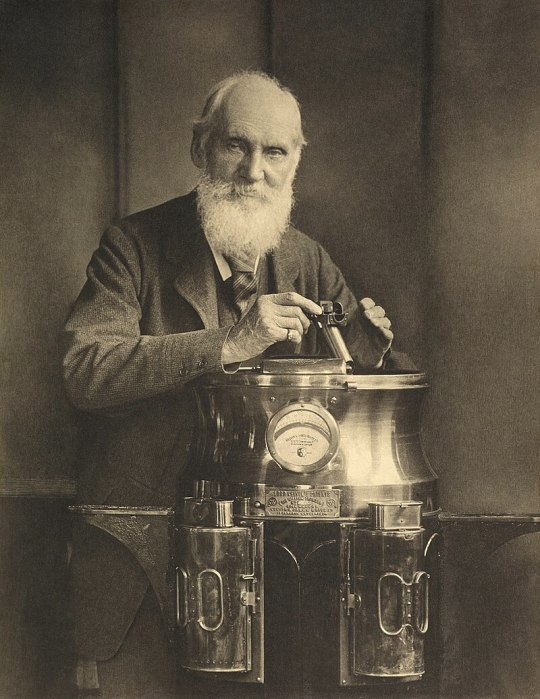
On December 17th 1907 William Thomson, Lord Kelvin died.
Kelvin was outstanding in theory as well as practice. His nephew died at sea and caused him to work for safety at sea; his compass was adopted worldwide; his tide gauge was in use for many years. He provided solutions for the laying of the first transatlantic telegraph cables. A system of temperature and make of refrigerator are named after him.
Although born in Northern Ireland, at 21-25 College Square East in Belfast in 1824, William Thomson spent most of his life in Scotland after his father became Professor of Mathematics at Glasgow University. Kelvin attended university classes from the age of 10. He wrote his first scientific paper, under the pseudonym 'PQR', aged only 16.
In his teens he learned French well enough to read the work of eminent French mathematician Jean Baptiste Joseph Fourier. Philip Kelland, Professor of Mathematics at Edinburgh University, had criticised Fourier's work on the theory of heat. Kelvin boldly stated that Kelland was wrong – and later scientists agreed with him.
From 1841 to 1845 Kelvin attended Cambridge University. He was an excellent student – although he shocked his father by spending his allowance on a boat, so it was not all work for the young scholar!
After graduating, Kelvin worked in a Paris laboratory with physics professor Victor Regnault.
Kelvin was influenced by the mathematical ideas of George Green, a self-taught miller's son from Nottingham.
He later brought an essay of Green's to the attention of fellow mathematicians and physicists by republishing it in a respected scientific journal. Until then the essay on mathematical analysis, electricity and magnetism had gone largely unnoticed.
In 1846, aged only 22, Kelvin returned to Glasgow to become Professor of Natural Philosophy. He remained in this post for 53 years. Keen to see students involved in practical experiment, he established what became the first university physics laboratory.
Kelvin continued to study the nature of heat. He realised that it would be useful to be able to define extremely low temperatures precisely. In 1848, he proposed an absolute temperature scale, now called 'the Kelvin scale'.
After further research, he formulated the second law of thermodynamics. This states that heat will not flow from a colder to a hotter body.
His interest in the transmission of electricity prompted his appointment as Director of the Atlantic Telegraph Company in 1856. The company was to install a telegraph cable under the Atlantic Ocean. Atlantic Cable Expeditions in 1857, 1858 and 1865 failed, but communication by cable finally succeeded in 1866.
From 1870 onwards, Kelvin spent many summers on his yacht 'Lalla Rookh', and invented several marine instruments to improve navigation and safety. He introduced a mariner's compass more accurate than any other in existence, and a machine to predict tide levels worldwide.
In 1884 Kelvin travelled to the United States to give a series of lectures. These were enthusiastically received, and were published in 1904 as the 'Baltimore Lectures'. He became a Lord in 1892 and took the name Kelvin because of his Glasgow connections. By the time of his death in 1907, he was an international celebrity, widely respected and honoured.
12 notes
·
View notes
Text
Related to my tags on the Irish American reblog, how long have bastardized "Celtic" crosses been neo-Nazi symbols? I wasn't aware of this stupid use until I was an adult and my father was equally unaware until I learned about it, and in our Celtic (American) Pride we often used Celtic cross imagery in decor and accessories. Granted these usually did resemble actually woven/knotted crosses (which by no means meant they were authentic. At best a few came from local Celtic Pride fests–which as I said in those tags was plagued by Confederate and Nazi imagery), but most of them came from like JoAnn's or Michael's or Walmart whenever Saint Paddy's Day rolled around. That said, the woven pattern of a Celtic cross is a bitch to draw especially when you have yet to nurture or be nurtured in any art skills, so when my borderline-Gothic ass would doodle graveyards in my school notebooks I would often doodle simplified Celtic crosses as grave markers, which unfortunately just meant a simple cross with a simple circle in it, unfortunately reminiscent of the neo-Nazi symbol.
Me and my family were staunchly Indiana liberals (to be fair that wasn't that shocking in our democrat enclave city) and have only become more leftist as time goes on, so those who knew me well would know I didn't mean anything by it, but like I have to wonder/worry that those who didn't know me well (like most of my classmates. I was pretty lonely in high school) or people who would briefly visit my home or come across us while we were wearing Celtic pins that day or something came away with the wrong impression. I'm especially dismayed at the thought that the kids I knew to be actual neo-Nazis might thought I was one of them
For the record I left school in like twenty eleven and had been doodling graveyards for years and wearing Celtic imagery for even longer. I can't really find out when the "Celtic" cross became a dogwhistle
#Celtic cross#Celtic Pride#tbh when going to those fairs it was under the pretense of being (mostly) Scottish#it was all a farce my dad leaned into because he was adopted by a Scots-Appalachian man with a Scottish name going back to an actual clan#BUT i was never supposed to know he wasn't my biological grandfather (even tho it was pretty damned obvious)#so my dad played heavily on Scottish pride#that said we had Irish ancestry from other branches of the family so we indulged in Irish pride and imagery too#plus we just felt the knotted crosses were pretty and cool looking#anyway i/my dad did end up having more Irish genetics than Scottish pending our DNA tests#the Scottish is there but the Irish is more. especially in me because my bio maternal grandfather was also Irish Appalachian#(i have some Ulster Scots too but less so. which is more surprising because it's more common for 'Irish' Appalachians to be Ulster instead)#somewhat-Gothic because i usually aligned with goths in personality and depression but rarely wore black#i usually wore boys graphic tees with stupid sayings and memes on them#at least until the obscenely stupid dress code went into affect (search my blog for that if you're interested lol it's a saga)#i was lumped in with the goths for lack of better placement anyway but arguably i was more boy scene#my high school didn't really have cliques or anything strictly categorical so like goths would hang with 'preps' and such anyway#but i did have more commonality with Goths and most of my few friends were#anyway I'm losing the thread#rambling in the tags
9 notes
·
View notes
Text
got planter gael blood in me, cant speak either of their languages 💪💪💪
#absolute academic weapon i am#ulster plantation? more like language degradation🤩🤩#im this close to saying fuck it and learning some ulster scots tbh only issue is for a good few centuries my familys been strictly catholic#and the scots language isnt my culture the way irish is ykwim idk im scared of liek intruding in ykwim
3 notes
·
View notes
Text
Who’s afraid of bilingual road signs?
#dougie rambles#personal stuff#vent post#ireland#irish language#gaelige#Ulster Scots#whatever that is
0 notes
Note
girl you ship scotwales?
crying because Kat and Riva are engwales shippers. I know a scoteng shipper and I'm a ScotIre shipper.
shipping the whole uk together,
YES, big fan, but specifically with my OC version! My Wales, called Tristan Mattock, is less of an uwu bean and more like. The sporty, friendly, if also dead tired UK brother. I wanna redesign him to give him more of a rugby player build, too.
Also, he has three mini pet dragons in the hetaverse and three cats in LFLS, who're called Rhew, Ulef and Poki.
#beareplies#maryeve#and in my heta stories/rps he was always the most powerful sorcerer of them all#followed by Ire and then England. N Ire didn't do any magic and thought her big bros were all nuts for it#teenagers am i right. Don't even believe in fae anymore#but yeahhhh I love and cherish Trissy boy and NEED to utilize him more.#storie nostre#scotwal#in the hetaverse it was my preferred Scot endgame but in LFLS I revived my Ulster OC Hannah and RIP Trissy boy#now ScotWal is the most tragic and heartbreaking romance I have. The playlist keeps wrecking me.#aph
9 notes
·
View notes
Text
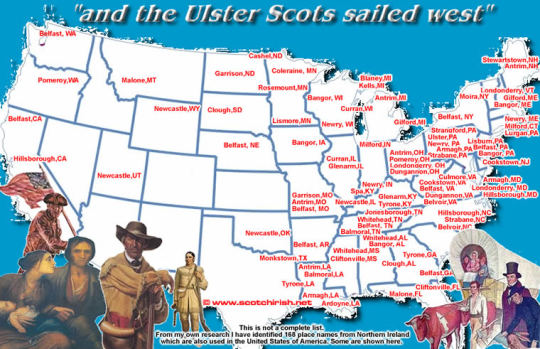
Richard Grant p. 119 - 129 - an interesting history of the migration of Ulster Scots to America in 18th century, arriving en masse in Pennysylvania in the 1720s, much to the consternation of the founding members of the community, the Quakers.
The map above pinpoints some of the place names in America that originate in Ulster.
Source: Ulster Connections blogspot.
3 notes
·
View notes
Text
i think they should do all of logans funeral in doric. just for a laugh.
#I KNOW HE DOESNT SPEAK IT ANYMORE BUT ITS FUNNY#fuck you. scotsifies your succession characters. gives each of your succession characters a different scots dialect for the laughs.#logans doric (obvs)#connor insular or ulster#kendall west#roman sec#and shiv south/borders#logan roy#succession
4 notes
·
View notes
Text
I always excuse my autism accent on the fact my dad is irish, which is true! it's just that... he doesn't have an irish accent. bc he deliberately gave himself a neutral english accent as a teenager.
#I did get drunk visiting family in norn iron several years ago and slipped into Incomprehensible Ulster Scots#i spent like 12 hours drinking and talking and my then-gf could barely understand me when we skyped before I went to bed#most of my childhood summers were spent there and several xmases so it did affect the slang I use and how I pronounce certain words#but the rest is All Autism babey#a hairdresser asked about my accent today which was funny bc I was in my literal hometown. thank god I prepare my masks in advance
1 note
·
View note
Text
this is what it feels like being from the six counties talking to scottish people who genuinely seem to believe they were colonised by the english

6 notes
·
View notes